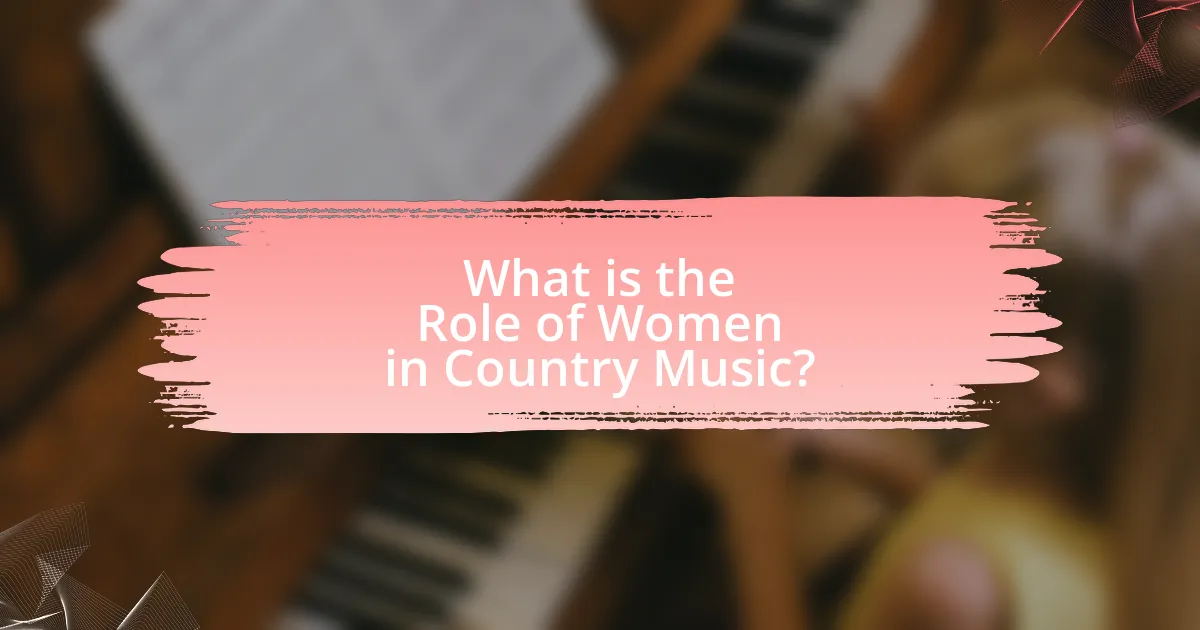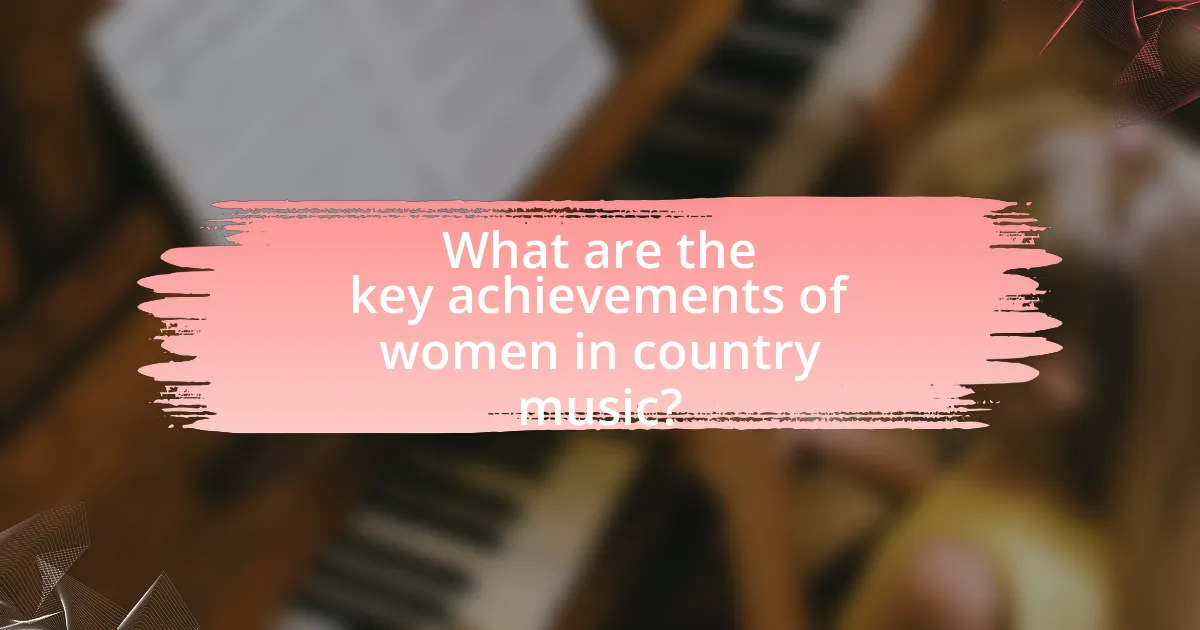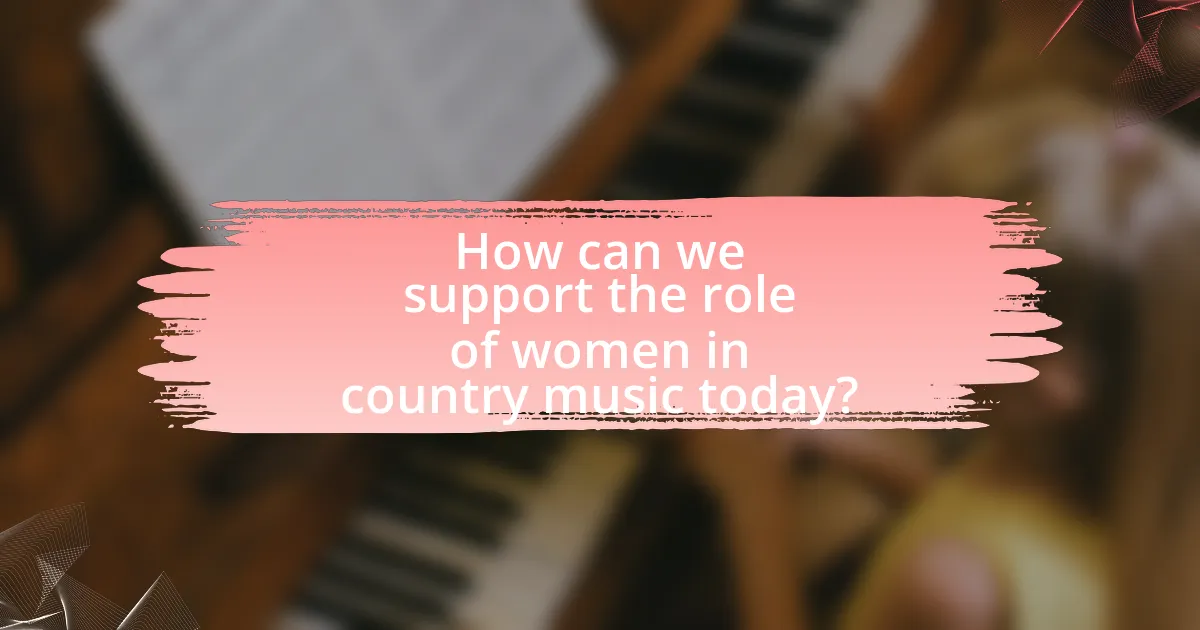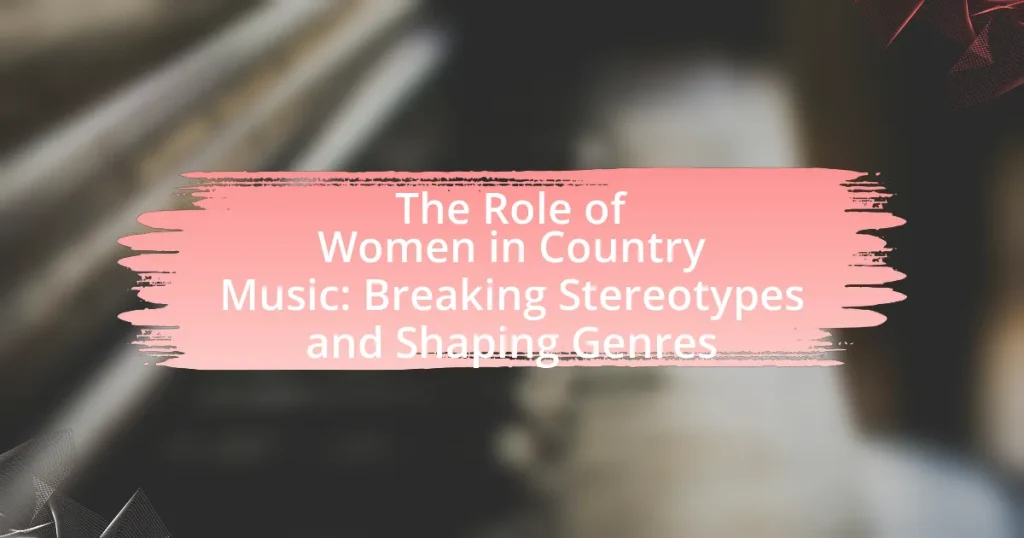The article examines the significant role of women in country music, highlighting their contributions to the genre’s sound, themes, and cultural narratives. It discusses the historical impact of pioneering artists like Loretta Lynn and Dolly Parton, who challenged societal norms and addressed issues such as gender equality and personal empowerment. The article also addresses the stereotypes women face in the industry, their achievements, and the ongoing efforts to promote female representation in country music today. Additionally, it explores how contemporary female artists are reshaping the genre by blending styles and addressing modern social issues, while emphasizing the importance of support and initiatives aimed at fostering inclusivity within the music industry.

What is the Role of Women in Country Music?
Women play a crucial role in country music by shaping its sound, themes, and cultural narratives. Historically, female artists like Loretta Lynn and Dolly Parton have challenged societal norms and addressed issues such as gender equality and personal empowerment through their lyrics. According to the Country Music Association, women have significantly influenced the genre, with female artists comprising approximately 30% of the top-charting songs in recent years. This representation highlights their impact on both the commercial and artistic aspects of country music, as they continue to break stereotypes and redefine the genre’s boundaries.
How have women historically contributed to country music?
Women have historically contributed to country music by shaping its sound, themes, and cultural narratives. Pioneering artists like the Carter Family and Patsy Cline brought unique vocal styles and storytelling techniques that influenced the genre’s development. Additionally, women such as Loretta Lynn and Dolly Parton addressed social issues through their lyrics, challenging gender norms and expanding the thematic scope of country music. Their contributions have been recognized through numerous awards, including Grammy Awards, and their influence is evident in the works of contemporary artists like Kacey Musgraves and Miranda Lambert, who continue to push boundaries within the genre.
What were the early influences of female artists in the genre?
Early influences of female artists in country music included pioneering figures such as the Carter Family and Maybelle Carter, who integrated vocal harmonies and instrumental skills that shaped the genre’s sound. Additionally, artists like Kitty Wells and Patsy Cline broke through gender barriers, introducing themes of female empowerment and emotional depth in their lyrics. Their contributions not only established a foundation for future female artists but also challenged the male-dominated industry, leading to a broader acceptance of women’s roles in country music.
How did societal norms shape women’s roles in country music?
Societal norms significantly shaped women’s roles in country music by dictating the expectations and limitations placed on female artists. Historically, women in country music were often confined to traditional roles that emphasized domesticity and emotional expression, reflecting broader societal views on gender. For instance, during the 1950s and 1960s, female country artists like Patsy Cline and Loretta Lynn navigated these norms by incorporating themes of resilience and independence in their music, challenging the stereotype of women as solely nurturing figures. This shift was evidenced by Lynn’s song “The Pill,” which addressed women’s reproductive rights, directly confronting societal expectations. Thus, societal norms not only influenced the content of women’s music but also propelled female artists to redefine their roles within the genre, leading to greater representation and diversity in country music.
What stereotypes have women faced in country music?
Women in country music have faced stereotypes that portray them as overly emotional, dependent on male counterparts, and primarily focused on traditional roles such as homemaking and relationships. These stereotypes often limit their artistic expression and visibility within the genre. For instance, female artists are frequently pigeonholed into themes of heartbreak and romance, while their male counterparts are celebrated for a broader range of topics, including personal empowerment and social issues. This disparity is evident in industry statistics, where women comprise only about 10% of the songs played on country radio, highlighting the systemic bias against female artists and their narratives.
How do these stereotypes manifest in the music and industry?
Stereotypes in the music industry manifest through the limited representation of women, often relegating them to traditional roles that emphasize appearance over talent. For example, female country artists frequently face pressure to conform to specific images, such as being overly feminine or focusing on romantic themes, which can overshadow their musical abilities. This is evident in the marketing strategies employed by record labels, which often prioritize looks and personal narratives over musical innovation. Additionally, studies show that women are underrepresented in songwriting and production roles, with only 12.3% of country songs being written by women in 2019, according to the Country Music Association. This disparity reinforces the stereotype that women are less capable in these creative positions, limiting their influence in shaping the genre.
What impact do stereotypes have on female artists’ careers?
Stereotypes significantly hinder female artists’ careers by limiting their opportunities and shaping public perception. Female artists often face biases that categorize them into narrow roles, affecting their visibility and marketability in the industry. For instance, a study by the Annenberg Inclusion Initiative found that only 12.3% of women were represented in country music charts, illustrating how stereotypes can restrict female representation. Additionally, these stereotypes can lead to unequal pay and fewer promotional opportunities compared to their male counterparts, further impacting their career advancement.
How have women shaped the evolution of country music genres?
Women have significantly shaped the evolution of country music genres through their contributions as artists, songwriters, and industry leaders. Pioneers like Loretta Lynn and Dolly Parton challenged traditional gender roles and brought attention to women’s experiences, influencing the lyrical content and themes within the genre. Their work not only expanded the narrative scope of country music but also paved the way for future female artists, such as Shania Twain and Miranda Lambert, who have continued to push boundaries and achieve commercial success. Statistics show that female artists have consistently topped country music charts, demonstrating their impact on the genre’s popularity and evolution.
What genres within country music have been influenced by female artists?
Female artists have significantly influenced various genres within country music, particularly country pop, Americana, and bluegrass. Country pop emerged in the 1970s and 1980s, with artists like Dolly Parton and Linda Ronstadt blending traditional country with pop elements, leading to mainstream success. Americana, which incorporates elements of folk, rock, and country, has been shaped by female artists such as Brandi Carlile and Kacey Musgraves, who have expanded the genre’s boundaries. Additionally, bluegrass has seen contributions from women like Alison Krauss, who has brought a fresh perspective and increased visibility to the genre. These influences demonstrate the vital role female artists play in evolving and diversifying country music.
How have women contributed to the blending of country with other music styles?
Women have significantly contributed to the blending of country music with other styles by introducing diverse influences and innovative sounds. Artists like Dolly Parton and Shania Twain have incorporated pop elements into their music, leading to crossover hits that expanded the audience for country music. Additionally, artists such as Kacey Musgraves have integrated elements of rock and hip-hop, showcasing versatility and attracting younger listeners. The collaboration of women with artists from genres like R&B and folk has further enriched the country genre, exemplified by collaborations like Maren Morris with Zedd on “The Middle.” These contributions have not only diversified the sound of country music but have also challenged traditional boundaries, making the genre more inclusive and dynamic.

What are the key achievements of women in country music?
Women in country music have achieved significant milestones, including breaking chart records, influencing the genre’s evolution, and advocating for gender equality. Notably, Loretta Lynn’s “Coal Miner’s Daughter” became a cultural touchstone, while Shania Twain’s “Come On Over” remains the best-selling studio album by a female artist in any genre, with over 40 million copies sold worldwide. Additionally, women like Dolly Parton and Miranda Lambert have received numerous awards, including multiple Grammy Awards, showcasing their impact and recognition in a traditionally male-dominated industry. These achievements highlight the vital role women play in shaping country music and challenging stereotypes.
Which female artists have made significant impacts in the industry?
Female artists such as Dolly Parton, Loretta Lynn, and Shania Twain have made significant impacts in the country music industry. Dolly Parton is renowned for her songwriting and vocal talent, with over 25 number-one hits and a career spanning more than six decades, influencing countless artists. Loretta Lynn broke barriers with her candid lyrics about women’s experiences, notably in songs like “Coal Miner’s Daughter,” which also became an autobiographical film. Shania Twain revolutionized country music in the 1990s by blending pop elements, leading to her album “Come On Over” becoming the best-selling studio album by a female artist in history, with over 40 million copies sold worldwide. These artists have not only shaped the genre but have also paved the way for future generations of female musicians.
What awards and recognitions have women in country music received?
Women in country music have received numerous awards and recognitions, including the Country Music Association (CMA) Awards, Academy of Country Music (ACM) Awards, and Grammy Awards. For instance, women like Loretta Lynn and Dolly Parton have been inducted into the Country Music Hall of Fame, highlighting their significant contributions to the genre. Additionally, female artists have won prestigious titles such as Female Vocalist of the Year at the CMA and ACM Awards, with winners including Carrie Underwood and Miranda Lambert. These accolades reflect the impact and influence of women in shaping country music and breaking industry stereotypes.
How have these achievements influenced future generations of artists?
The achievements of women in country music have significantly influenced future generations of artists by paving the way for greater representation and creative freedom. Pioneers like Loretta Lynn and Dolly Parton challenged societal norms, demonstrating that women could express their experiences and assert their identities in a male-dominated genre. Their success has inspired contemporary artists such as Kacey Musgraves and Maren Morris, who continue to push boundaries and address issues like gender equality and personal authenticity in their music. This legacy of empowerment and innovation has fostered a more inclusive environment in country music, encouraging new artists to explore diverse themes and styles.
What role do women play in contemporary country music?
Women play a significant role in contemporary country music by influencing its sound, themes, and cultural narratives. Prominent female artists like Miranda Lambert, Kacey Musgraves, and Carrie Underwood have not only achieved commercial success but also challenged traditional gender roles within the genre. For instance, Miranda Lambert’s lyrics often address empowerment and resilience, while Kacey Musgraves incorporates progressive social themes, reflecting broader societal changes. According to the Country Music Association, women accounted for 30% of the top 100 country songs in 2020, indicating their growing presence and impact in the industry. This shift highlights how women are reshaping country music, breaking stereotypes, and expanding the genre’s boundaries.
How are modern female artists challenging traditional norms?
Modern female artists are challenging traditional norms in country music by redefining gender roles and addressing social issues through their lyrics and performances. For instance, artists like Kacey Musgraves and Maren Morris incorporate themes of empowerment, sexuality, and mental health, which were historically marginalized in the genre. Musgraves’ album “Golden Hour” won a Grammy for Album of the Year, showcasing her innovative approach that blends personal narratives with broader societal commentary. Additionally, Morris’s hit “Girl” promotes female solidarity and resilience, directly confronting stereotypes about women’s roles in both music and society. These artists exemplify a shift towards inclusivity and authenticity, reshaping the landscape of country music.
What collaborations highlight the contributions of women in the genre?
Collaborations such as “Girl Crush” by Little Big Town featuring Hillary Scott and “Forever and Ever, Amen” by Randy Travis with Carrie Underwood highlight the contributions of women in country music. These collaborations showcase female vocalists’ influence and artistry, with “Girl Crush” reaching number one on the Billboard Hot Country Songs chart, demonstrating the commercial success of women in the genre. Additionally, the participation of women in songwriting and vocal performances in these collaborations emphasizes their integral role in shaping country music’s narrative and sound.

How can we support the role of women in country music today?
To support the role of women in country music today, industry stakeholders must prioritize equitable representation in all aspects of the music business, including production, songwriting, and performance opportunities. Research indicates that women artists receive significantly less airplay on country radio, with a 2020 study by the Country Music Association revealing that only 10% of songs played on country radio were by female artists. By actively promoting female artists through playlists, awards, and festival lineups, the industry can help to dismantle existing barriers and foster a more inclusive environment. Additionally, mentorship programs connecting established female artists with emerging talent can provide essential guidance and support, further empowering women in the genre.
What initiatives exist to promote female artists in country music?
Initiatives to promote female artists in country music include organizations like the Country Music Association (CMA) and the Women’s Music Business Network (WMBN), which provide resources, networking opportunities, and mentorship programs specifically for women in the industry. The CMA has launched campaigns such as “CMA’s 2020 Vision,” aimed at increasing the visibility of female artists and ensuring equitable representation in country music. Additionally, events like the “Women of Country” showcase highlight female talent and foster collaboration among artists. These initiatives are supported by statistics indicating that female representation in country music has historically been low, prompting industry stakeholders to actively work towards change.
How can fans contribute to the visibility of women in the genre?
Fans can contribute to the visibility of women in country music by actively promoting female artists through social media, attending their concerts, and supporting their music purchases. By sharing content related to women in the genre, fans can amplify their voices and increase their reach. For instance, a study by the Country Music Association found that female artists receive significantly less airplay compared to their male counterparts, highlighting the need for fan-driven advocacy. Engaging in discussions about female representation and celebrating their achievements can further enhance visibility and challenge existing stereotypes in the industry.
What are some organizations dedicated to supporting women in music?
Organizations dedicated to supporting women in music include Women in Music, which advocates for gender equality and provides networking opportunities, and the Alliance for Women in Media, which focuses on empowering women in media and entertainment. Additionally, the Music Industry Women’s Network offers mentorship and resources specifically for women in the music industry. These organizations contribute to the advancement of women in music through advocacy, education, and community building.
What best practices can be adopted to foster inclusivity in country music?
To foster inclusivity in country music, industry stakeholders should actively promote diverse voices and narratives within the genre. This can be achieved by providing platforms for underrepresented artists, such as women, people of color, and LGBTQ+ individuals, to showcase their work. Research indicates that increased representation leads to broader audience engagement; for instance, a 2021 study by the Country Music Association found that songs by female artists received 20% more streaming plays when featured prominently in playlists. Additionally, mentorship programs can be established to support emerging artists from diverse backgrounds, ensuring they have access to resources and networks that facilitate their success. By implementing these practices, the country music industry can create a more inclusive environment that reflects the diversity of its audience.
How can industry stakeholders create more opportunities for women?
Industry stakeholders can create more opportunities for women by implementing targeted mentorship programs and equitable hiring practices. Research indicates that mentorship significantly boosts women’s career advancement; for instance, a study by the American Association of University Women found that women with mentors are more likely to receive promotions and salary increases. Additionally, stakeholders can establish policies that promote gender diversity in hiring, as companies with diverse leadership are 35% more likely to outperform their peers. By prioritizing these strategies, industry stakeholders can effectively enhance women’s representation and success in country music.
What steps can aspiring female artists take to navigate the industry successfully?
Aspiring female artists can navigate the music industry successfully by building a strong network, honing their craft, and leveraging social media for visibility. Establishing connections with industry professionals, such as producers and other artists, can lead to collaboration opportunities and mentorship, which are crucial for career advancement. Additionally, continuous improvement of their musical skills through practice and education enhances their artistic credibility. Utilizing social media platforms effectively allows female artists to showcase their work, engage with fans, and promote their brand, which is essential in a digital-first industry. According to a 2021 report by the Annenberg Inclusion Initiative, women in music still face significant barriers, making these steps vital for overcoming challenges and achieving success.


